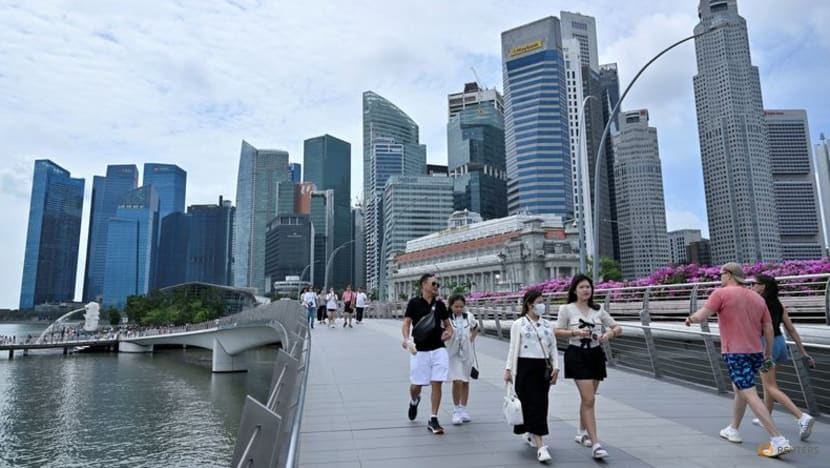Commentary: Budget 2024 - Remaking Singapore, one Budget at a time
In seeking to remake Singapore root and branch, Budget 2024 has set the tone for subsequent Budgets, says SMU associate professor of law Eugene Tan.

A view of the Singapore skyline on Jan 27, 2023. (File photo: Reuters/Caroline Chia)

This audio is generated by an AI tool.
SINGAPORE: The first instalment of remaking Singapore’s social compact was unveiled in Friday’s (Feb 16) Budget 2024 speech by Deputy Prime Minister and Finance Minister Lawrence Wong. It is a comprehensive fiscal policy that seeks to reassure Singaporeans at a time of global tumult. It addresses top-of-mind concerns such as cost of living, inflation and employability, while also ensuring that Singapore continues to be a home and a land of hope and opportunity.
Costing almost S$131.4 billion (US$97 billion), the fiscally balanced Budget is generous but also not overly so. Every major demographic is allocated some budgetary dividend, including cash handouts.
If need be, the People's Action Party (PAP) government can go to the General Election, due latest in November 2025, with it. But it is unlikely there will be such haste for now.
Might this be the last time Mr Wong presents the Budget as he is slated to succeed Prime Minister Lee Hsien Loong by year’s end? I doubt so.
He may double-hat as Finance Minister as Mr Lee did for three years after becoming prime minister in 2004. Being the point man for Forward Singapore and with its implementation in its fledgling stages, we should not be surprised if Mr Wong were to present a few more Budgets.
MAKING FORWARD SINGAPORE A MOVEMENT
On the eve of Budget 2024, Mr Wong had indicated that it would be the first instalment of the Forward Singapore roadmap.
In all, S$5 billion has been allocated this year to strengthen social safety nets as part of the first suite of measures under the Forward Singapore exercise.
The government seeks to galvanise Singapore society through transforming Forward Singapore into a movement. Mr Wong revealed that by the end of this decade, almost S$40 billion will be spent for the identified seven policy shifts to keep the social compact relevant and fit for purpose.
Much anticipated was the announcement on supporting the involuntarily unemployed through “re-employment support”, which was first raised in January 2023. But the patient waiting continues as the government wants to avoid the “pitfalls” encountered by other countries when unemployment benefits were introduced. It’s a question of when rather than whether. Mr Wong indicated that details of the scheme can be expected later this year.
In the meantime, to promote “employment resilience” in the face of a rapidly changing workplace disrupted by technology and competition, Singaporeans will receive a top-up to their SkillsFuture accounts. To help Singaporean mid-career workers who would have last completed formal education almost two decades ago, a S$4,000 SkillsFuture Credit will be provided for those who are aged 40 and above. The new credit can be used for selected industry-oriented courses as well as part-time and full-time tertiary programmes, details of which will be announced at the Ministry of Education Committee of Supply.
Additionally, mid-career workers who wish to go back to school full-time will be given an allowance to do so. The SkillsFuture Mid-Career training allowance will be equivalent to 50 per cent of their average income in the last 12 months and capped at S$3,000 a month. This will enable those seeking a mid-career switch to enrol in selected full-time courses to receive the training allowance for up to 24 months in their lifetime.
This is to deal with the dilemma often faced by displaced workers who need new jobs requiring new skill sets and know-how, but who have families to support and cannot afford to go for training while unemployed.
With this training allowance, it is likely more will bite the bullet and seek reskilling and upskilling, rather than taking the first available job that may see them being displaced again before long.
BOOSTING SKILLS AND TRAINING AND SOCIAL MOBILITY
Budget 2024 is an important first step in strengthening the skills and training eco-system by better supporting Singapore’s workforce in accessing more training support. Funding aside, it is crucial that the SkillsFuture Level-Up Programme instils the lifelong habit and motivation for continual learning. If so, they will give meaning to the Forward Singapore policy shifts of “respect and reward for every job” and “learning beyond grades”.
In similar vein, the Budget seeks to reduce wage gaps through raising the qualifying income threshold for the Workfare Income Supplement scheme from S$2,500 to S$3,000. The maximum annual payouts will also be increased from S$4,200 to S$4,900.
Institute of Technical Education (ITE) graduates, in particular, get a shot in the arm for their upskilling journey. They will receive a S$5,000 top-up to their Post-Secondary Education Account when they enrol in a local diploma programme. When they earn their diploma, they will receive a further top-up of S$10,000 to their Central Provident Fund (CPF) Ordinary Account.
Also provisioned is funding for the ComLink+ Progress Packages to support eligible lower-income families with young children that seek to pull themselves up by their bootstraps through preschool education, employment, financial stability and saving towards home ownership. This concerted effort seeks to advance social mobility by lending a hand to those seeking to break out of the cycle of poverty.
With Singapore on the cusp of being a super-aged society, the Budget also makes provisions for healthcare affordability and accessibility, retirement adequacy, families at every stage – be it through making preschools more affordable, helping students with special needs by reducing out-of-pocket expenses for their education and student care, and promoting employment opportunities and community integration for adults with disabilities.
Where do all these budgetary expenditures lead us to? They are ultimately about a stronger and more united nation – one that is high trust, safe and secure, energy secure, nurtures a culture of giving, and promotes a sense of solidarity through common experiences with arts and sports as key avenues.
ECONOMY MATTERS TOO
Lest it be mistaken that the Budget is all social since about three-quarters of Mr Wong’s speech was devoted to ostensibly social measures, Mr Wong reminded the parliament that the key priority is to have a “strong, innovative and vibrant economy” as the prerequisite to good jobs and better lives for Singaporeans “on a sustained basis”.
Put simply, the social and the economic are really two sides of the same coin. Moreover, the social investments have pay-offs in the economic realm as workers command good jobs and better wages.
Even as we make no apology for pursuing growth, Mr Wong reiterated it is not “growth at all costs”; in any case, there are limits posed by constraints inland, labour and carbon. The ambitious target is about 2 to 3 per cent annual gross domestic product growth over the next decade. In 2023, the economy grew by 1.1 percent.
On the economic front, the Budget seeks to enhance Singapore’s ability to attract high-quality and high-value investments. To do that, Singapore needs to build on its strengths and develop new ones. Research and development will receive a boost of S$3 billion, adding to the commitment of S$25 billion for the period from 2020 to 2025.
To bolster talent and industry development in artificial intelligence (AI) activities, which Mr Wong described as a “general-purpose technology” that can transform a range of industries and to enhance productivity, more than S$1 billion will be invested in the next five years. The national broadband network will also be upgraded to support AI and immersive media technologies which will become more pervasive in the future.
A CONSEQUENTIAL FISCAL POLICY
With the best of plans now laid out, the task ahead is how the fourth-generation leadership led by Mr Wong will flex the fiscal muscle, endowed by prudent and disciplined spending and careful husbandry of the national reserves, to inspire Singaporeans as we navigate a crucial inflection point in our history.
Singapore celebrates 60 years of independence in 2025 and the founding ethos of a start-up nation must be rekindled so that Singapore continues to thrive and deepen her sovereignty and identity.
In seeking to remake Singapore root and branch, Budget 2024 has set the tone for subsequent Budgets.
Eugene K B Tan is associate professor of law at the Singapore Management University and a former Nominated Member of Parliament.




















